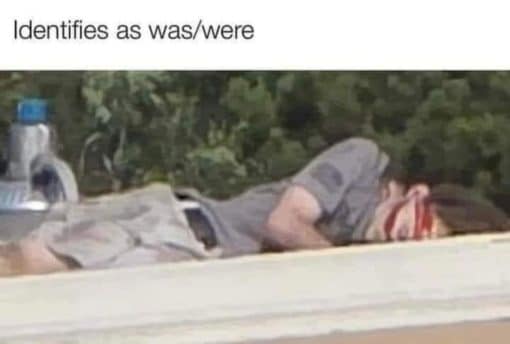Identifies as was were
The image depicts a person lying down on what appears to be a flat surface, like a bench or an elevated platform. They are dressed casually, wearing a grey short-sleeved shirt and shorts. The person's feet are bare, suggesting a relaxed or perhaps unexpected rest. Notably, they seem to be asleep, given their closed eyes and the open-mouthed position which often indicates deep sleep or complete relaxation.
Next to the person is a clear blue water bottle, which provides context for the setting—this could be a leisure area where people might exercise or take breaks, hence the need for hydration. The bottle's presence injects a slice of everyday life into the scene: people carry water bottles during various activities, and this person has seemingly taken a break, to the point of falling asleep.
Above the person is a line of text reading "Identifies as was/were". This caption is a play on the concept of identity, commonly discussed in social and psychological discussions about self and group identification. It also uses a grammatical joke, as "was" and "were" are past tense verbs in English, implying a humorous connection to the past tense of being—essentially equating the person's current state to an inanimate object.
The humor in the image likely emanates from this pun, as the wordplay surprises the reader by linking the person's unusual sleeping position to linguistic terms that typically don't describe people. It’s the unexpected collision of grammar humor with a candid, real-life moment that can tickle the funny bone.
Furthermore, the humor may arise from the sheer relatability of the situation. Many viewers might connect with the idea of being so exhausted that they could fall asleep anywhere, at any time. There is a universally understood comedy in the collapse into sleep in an unconventional place, especially when tagged with a caption that winks at language in such a literal way.
Lastly, the picture could be amusing due to its randomness and the questions it raises. The scenario seems out-of-the-ordinary—people don't typically sleep in such places, in such a manner—making the image a snapshot of an offbeat moment. The caption adds a final twist, making it not just a peculiar situation, but also a playful joke on the English language, encouraging a light-hearted interpretation of an otherwise ordinary scene. Identifies as was were
